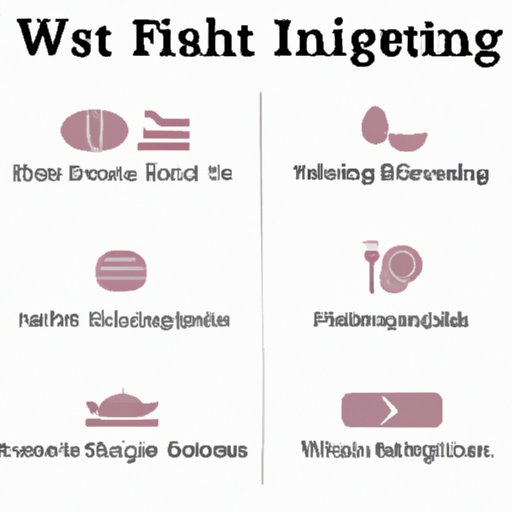
Introduction:
Losing weight can feel like an impossible task for many, often leading to feelings of frustration and hopelessness. However, there are several effective tips and strategies that can help jumpstart your weight loss journey. In this article, we will discuss some of the most efficient and science-backed ways to lose weight and achieve a healthier body.
Intermittent Fasting (IF)
Intermittent fasting involves cycling between periods of eating and fasting, with a goal of reducing overall calorie intake and promoting weight loss. There are several methods of IF, such as the 16/8 method, 5:2 diet, and alternate-day fasting, that can be suitable for different lifestyles.
While fasting, it is essential to consume nutrient-dense foods that promote satiety and nutrient intake. Meal planning and preparation can be helpful in ensuring the consumption of healthy and balanced meals during the eat period.
IF has several health benefits, such as improving insulin sensitivity, reducing inflammation, and increasing fat burning. However, potential drawbacks include hunger, irritability, and headaches. To overcome these, it is important to start gradually and stay hydrated during the fasting period.
High-Intensity Interval Training (HIIT)
HIIT involves short and intense bursts of exercise followed by periods of rest or lower-intensity exercise. It has been found to be more effective in burning fat and boosting metabolism than traditional steady-state cardio exercises.
A basic HIIT workout can consist of exercises like sprinting, jumping jacks, and mountain climbers, done for a short but intense period with rest intervals in between. A sample HIIT workout plan could include exercises like 30 seconds of high-intensity exercise followed by 15 seconds of rest, repeated for 10-15 minutes.
HIIT has several benefits, such as increasing metabolism, improving cardiovascular health, and burning fat, but it can also lead to injury and burnout. To avoid this, it is important to start at a comfortable level and gradually increase intensity and duration over time.
Plant-Based Diets
Plant-based diets involve consuming mainly plant-based foods like fruits, vegetables, grains, and legumes while minimizing or eliminating animal products. They have been found to be effective in promoting weight loss, improving health, and reducing the risk of chronic diseases.
Switching to a plant-based diet can be challenging, but gradual and well-planned dietary changes can help make the transition easier. It is important to ensure a variety of nutrient-dense plant-based foods to meet the body’s nutritional needs and avoid common pitfalls like the consumption of processed foods and too many high-calorie vegetarian options.
Plant-based diets have several benefits, such as faster weight loss, higher fiber intake, and lower risk of chronic diseases. However, potential drawbacks include inadequate protein and vitamin B12 intake. To overcome these, it is important to include plant-based protein sources and consider vitamin B12 supplementation if needed.
Mindful Eating
Mindful eating involves paying attention to bodily sensations, emotions, and thoughts while consuming food. It can help promote weight loss, improve food choices, and reduce overeating.
Practical tips for eating mindfully include avoiding distractions like smartphones and TVs, eating slowly and chewing food thoroughly, paying attention to hunger and satiety cues, and appreciating the taste and texture of food.
Mindful eating has several benefits, such as improved digestion, better food choices, and less overeating. To incorporate mindfulness into daily life, it is essential to start with small and achievable goals and gradually build up from there.
Sleep Hygiene
Sleep hygiene refers to habits and practices that promote good sleep quality and quantity. It is essential for overall health, including weight loss.
Practical tips for improving sleep hygiene include establishing a regular sleep schedule, avoiding caffeine and nicotine late in the day, creating a comfortable sleep environment, and reducing exposure to blue light from electronic devices before bedtime.
Sleep affects metabolism and hormones, influencing appetite, calorie intake, and energy expenditure. Proper sleep hygiene can lead to improved weight loss, better appetite control, and reduced stress.
Conclusion
Jumpstarting weight loss can involve various strategies and tips, including intermittent fasting, high-intensity interval training, plant-based diets, mindful eating, and proper sleep hygiene. It is essential to find what works best for your lifestyle and body and stay persistent and consistent in achieving your weight loss goals.




